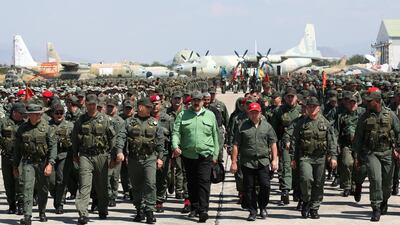With mounting pressure from the US and its allies, Venezuela's President Nicolas Maduro has said he is willing to sit down with the opposition to find a peaceful solution as he refuses to bow to demands to step down after a contentious election.
While US President Donald Trump hailed the news as evidence that increasing American sanctions had forced Mr Maduro’s hand, the Venezuelan opposition are wary of the olive branch having seen the leftwing firebrand make similar offers in the past only to renege.
As Mr Maduro offered to sit down “for the sake of Venezuela’s peace and its future,” National Assembly President Juan Guaido – who is now recognised by over 30 countries as the president in waiting – was facing his own sanctions from his country’s Supreme Court.
The highest judicial body slapped Mr Guaido with a travel ban and froze his bank accounts just a day after the US handed him access to Venezuela’s assets held in America.
In his offer, Mr Maduro suggested that Mexico, Uruguay or the Vatican could act as intermediaries in talks but also said that elections wouldn't take place again until 2025. But Mr Guaido and his allies will clearly remember a similar Vatican-led mediation after uprisings in 2016.
The outcome was protesters leaving the streets, a number of political prisoners were set free and then Mr Maduro doubled down and built a new congressional body to rewrite the constitution in his favour.
The fallout set the opposition back and left them divided. This wasn’t the only time Mr Maduro has made the ultimately empty offer of concessions.
In the run up to the presidential elections, he offered to negotiate terms of the vote and even the date, but then banned most viable opposition candidates from running.
Mr Guaido hasn’t yet replied to Mr Maduro’s offer.
In the meantime, the mass protests that have killed at least 40 over the last week are expected to continue. In the wake of violence, Mr Trump warned Americans not to travel to Venezuela “until further notice”.
Mr Maduro has also accused military deserters of becoming “mercenaries” hiding in neighbouring Colombia to plan his ouster. The embattled president’s comments come a day after White House National Security Adviser John Bolton was snapped in a press conference holding a legal pad with two lines of handwriting: “Afghanistan --> welcome the talks. 5,000 troops to Colombia.”
Without mentioning Mr Bolton’s apparent message, Mr Maduro said: “Military deserters have become mercenaries of the Colombian oligarchy and conspire from Colombia to divide the armed forces.”
His comments came as he led a march of 2,500 soldiers at a barracks in Caracas. Mr Maduro has increasingly appeared alongside the military in a bid to cement and demonstrate that he still has the backing of the armed forces despite some defections.
The wife of a rebel military officer and outspoken critic of Mr Maduro said he has been arrested as he attempted to sneak back into Venezuela from Columbia.
Sorbay Pailla said she heard from retired National Guard Col Oswaldo Garcia Paloma on Sunday after he snuck over the border. She said that contacts in the security services then told her he had been arrested in the western state of Barinas.
While there is no official comment, Luis Almagro, the head of the Organisation of American States, condemned late Tuesday what he called the "kidnapping" of Garcia Paloma.
Mr Paloma has been open for months about his intent to amass a military force in exile to remove Maduro.
Venezuela's economy has sputtered to a halt under Mr Maduro and a mass outpouring of anger has accompanied a contentious election that many deem to have been rigged in the incumbent’s favour.
Against a backdrop of food shortages and inflation topping 10 million per cent this year, Mr Guaido has emerged as the leader of a movement to end Mr Maduro’s six-year term.
Some 10 per cent of the population have now fled the country.


